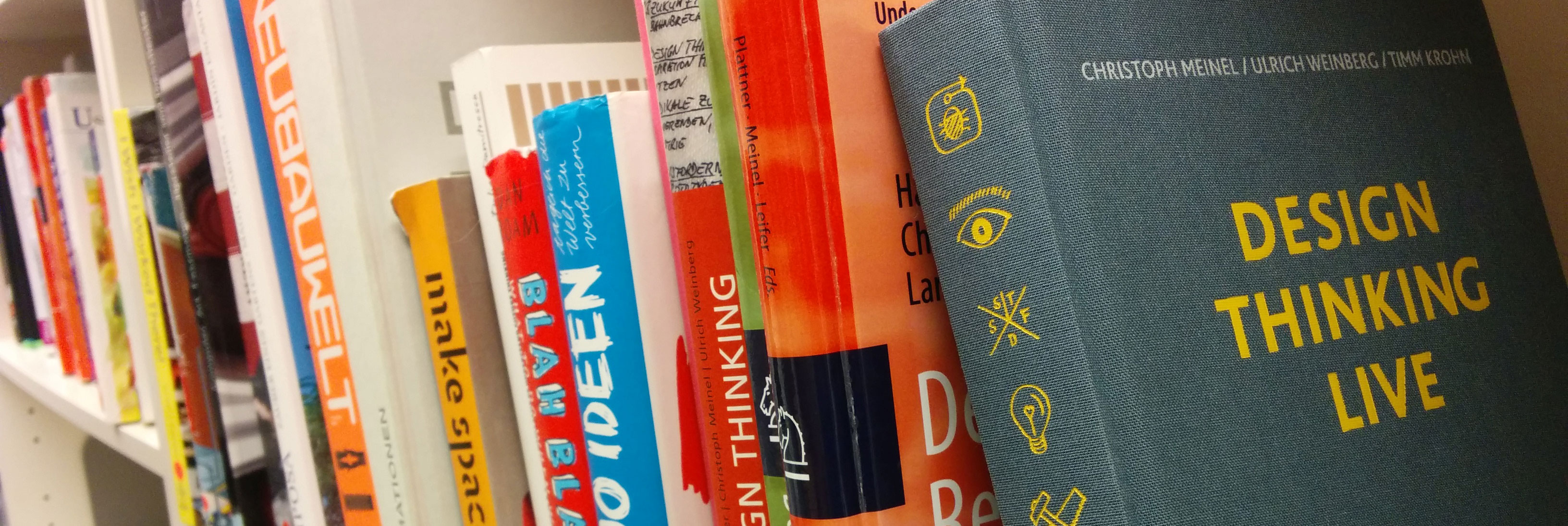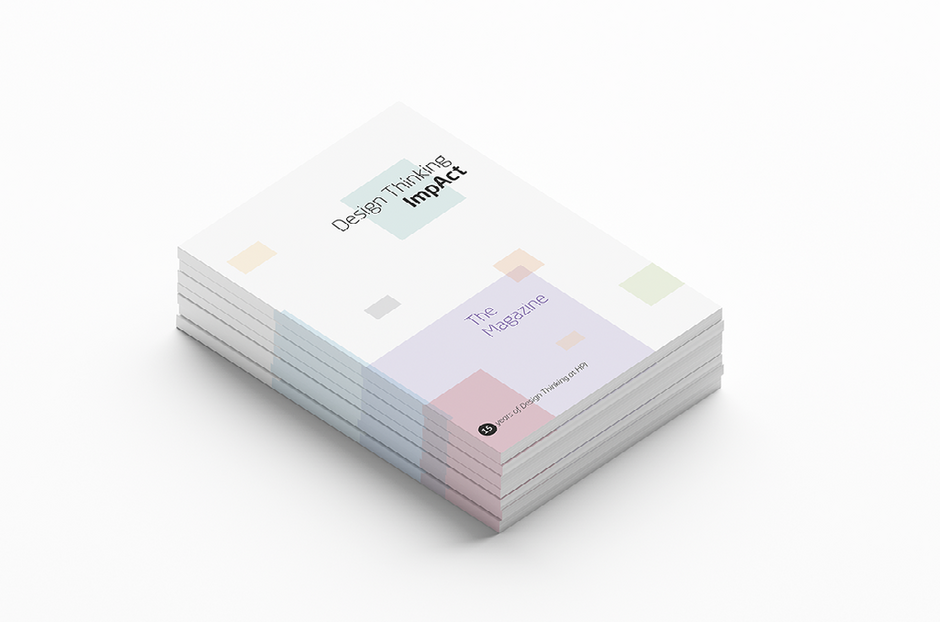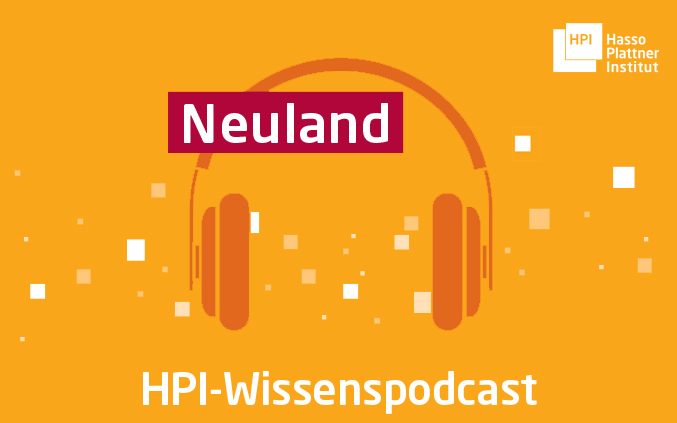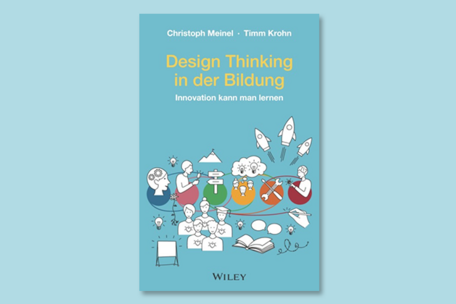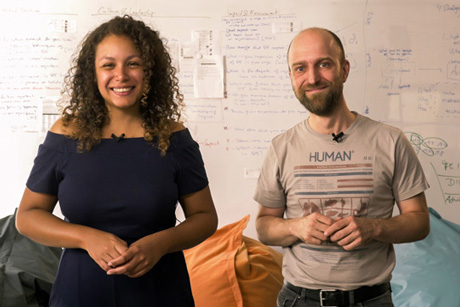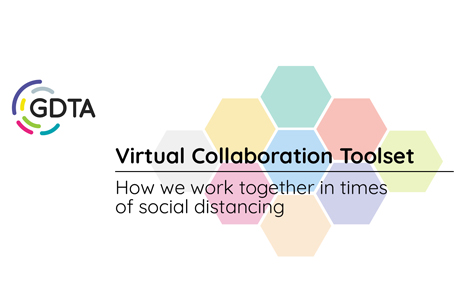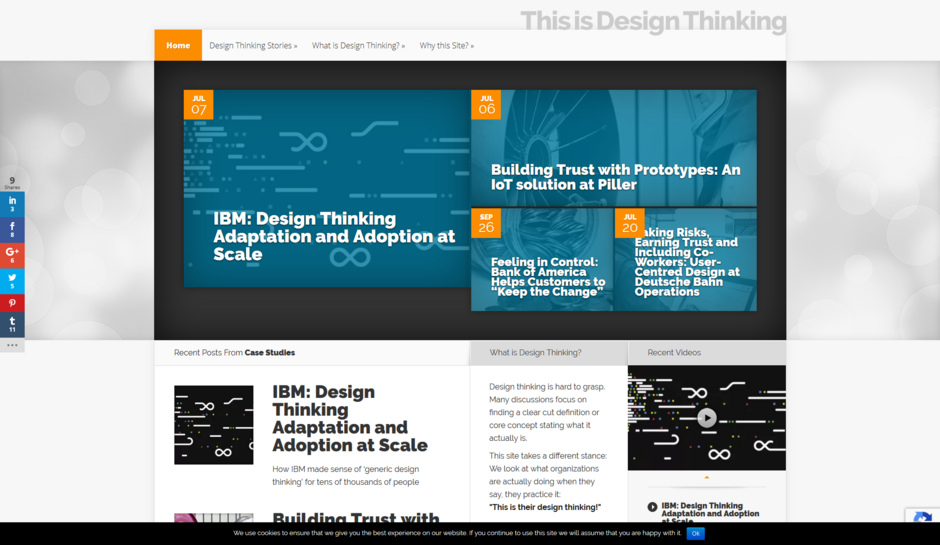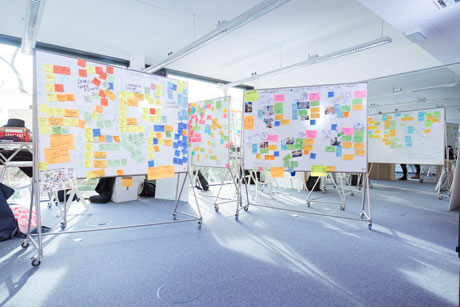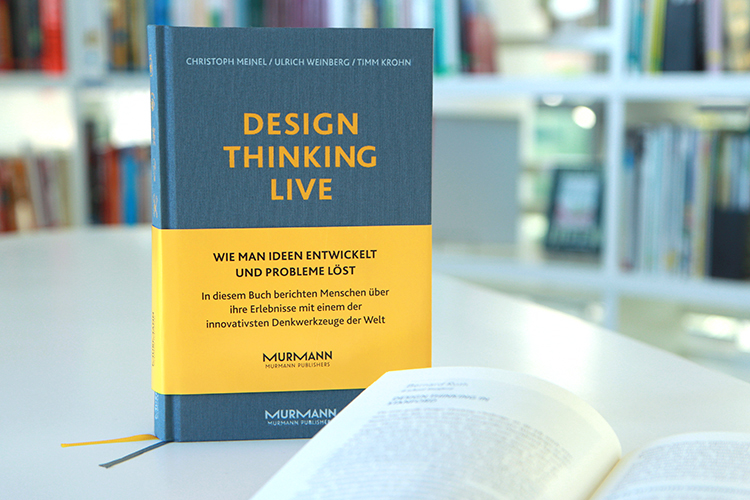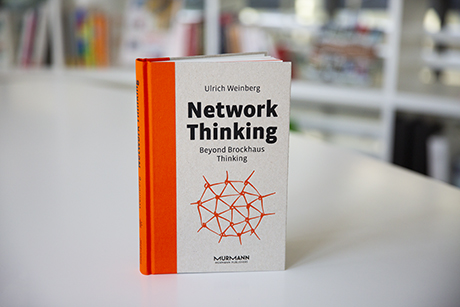Design Thinking ImpAct Magazine
The Design Thinking ImpAct Magazine showcases the impact the HPI Design Thinking community has created in the past 15 years. We invite you to read about successful Design Thinking projects, alumni stories, research insights, and much more. Hopefully, you find inspiration and join us in further shaping the future with Design Thinking.
"Design Thinking in Practice" - a global study on implementation practices in organizations
The study “Design Thinking in Practice” examines the implementation practice of Design Thinking in organizations. It follows on from a 2015 study by the Hasso-Plattner-Institute and the Stanford Design Thinking Research Program, which aimed to better understand what organizations actually do when they claim to practice Design Thinking. This study sought to analyze the evolution over the past six years and outline the scope of the study. To do this, it examined various implementation aspects, such as strategy, process, tools & mindset, and impact & measurement. Using these organizations that claim to implement Design Thinking, cross comparisons were made to identify both significant differences and simplifications in the way Design Thinking is interpreted and applied in organizations.
Neuland – Der HPI Wissenspodcast, episode 54: Design Thinking - New Global Study about the Power of Innovation in Organizations
Design thinking is more than just a method case full of techniques. In more and more companies, the approach is lived as part of the innovation culture. In their study "Design Thinking: a Global Study on Implementation Practices in Organizations", Stefanie Gerken, Lab Designer & Facilitator at Deloitte Greenhouse and Design Thinking Track Lead at the HPI School of Design Thinking, and Falk Uebernickel, Professor of Design Thinking & Innovation Research at HPI, have analyzed the developments and changes in design thinking practices in organizations. In the new episode of the HPI knowledge podcast Neuland, they provide insights into the results. Listen here.
New book "Design Thinking in der Bildung: Innovation kann man lernen (Design Thinking in Education: Innovation can be learned)"
On October 6, the new book "Design Thinking in der Bildung: Innovation kann man lernen (Design Thinking in Education: Innovation can be learned)" from the academic publisher Wiley-VCH will be available in German language. The reports of many scholars in the new anthology, based on both theory and practice, show how great the potential of design thinking is in education as well. They present innovative educational approaches in a variety of fields, illuminate them from different angles, and open up new perspectives for the education system to readers. It is an appeal by scholars and practitioners to break new ground in education in order to prepare our society for the diverse challenges of the 21st century. An English volume will be published by Springer Nature and is due for release in early 2022. You can buy the book in German language here.
Neuland – Der HPI Wissenspodcast, episode 46: The future of work is hybrid
The Corona pandemic has shifted working life almost entirely to the digital. After the lockdown, many wish they could integrate these newfound digital advances into their everyday working lives. A survey conducted by the HPI D-School among employees and students proves this: Hardly anyone can imagine a 5-day week in presence any more. Now it is time to find out how hybrid working can function as a solution in the future. Team spaces will now be more important than individual offices. In teaching, too, we need to try out what solutions and possibilities this new form of working offers. The advantages are that handicapped people can be better included and that the environmental impact will decrease by reducing the number of working trips. Prof. Ulrich Weinberg, head of the HPI School of Design Thinking, talks about the cultural and technical changes in the world of work in the new episode of the HPI knowledge podcast "Neuland". Listen here (in German).
Neuland – Der HPI Wissenspodcast, episode 44: How to use Design Thinking for your life planning
The innovation method and mindset of Design Thinking is not only interesting for teams, but also to clarify the important questions of life: What path do I want to take and how do I reconcile my career with the things in my life that are important to me? With the new “Wayfinder” program of the HPI School of Design Thinking, which is based on the principles and methods of Design Thinking, Systemic Coaching and Positive Psychology, it is possible to answer these questions and discover untapped potentials in each individual. Dr. Claudia Nicolai, Academic Director of the HPI School of Design Thinking (D-School), Dr. Martin Schwemmle, Innovation Researcher and Design Thinking Coach at the HPI D-School and Klaudia Thal, Systemic and Design Thinking Coach at the HPI D-School, will talk about this in the new episode of the HPI knowledge podcast “Neuland ”. Listen here (in German).
Neuland – Der HPI Wissenspodcast, episode 36: Agile work with Design Thinking
The world of work is constantly changing, and especially in today's world, teams must work flexibly and dynamically with each other, achieve project goals together and implement visions in a goal-oriented manner. But what exactly is agile working? How does it relate to Design Thinking and for which companies does this approach make sense? In the new podcast episode Neuland, Prof. Dr. Falk Uebernickel and moderator Leon Stebe talk about necessary change processes in companies and how structural change can be successful. Listen here (in German).
MOOC: Mastering Design Thinking in Organizations
Design Thinking (DT) is a valuable approach for enabling effective innovation in organizations (Kolko 2015). Just as a company’s, objectives for DT are diverse, so is the diversity of how and why organizations implement and succeed DT. While some companies start small in one department, others make DT part of their strategy and implement DT globally throughout the whole organization and embed it into their corporate DNA. In this online course, you will learn about the importance of design to digital innovation, Design Thinking implementation strategies in different organizations, and much more. Enroll for free on open HPI.
Neuland – Der HPI Wissenspodcast, Folge 34: From Design Thinking Project to Successful Company
In our Design Thinking supplementary study program, interdisciplinary teams learn how to initiate transformation and innovation processes and how to design them in a human-centered way. The innovation approach helps to quickly find creative solutions to complex problems and encourages students each year to start their own start-up. But what exactly happens during a Design Thinking course? What do participants do after graduation? And how can they develop a successful business idea from what they have learned in university projects?Listen here (in German).
Neuland – Der HPI Wissenspodcast, Episode 32: Design Thinking: Creative teamwork in the virtual space
The Corona crisis managed one thing in just a few days - to move work into virtual space to the greatest possible extent. But beyond the usual formats, what possibilities are there for making work in virtual space more creative? How does a good virtual team work? And what are the advantages of working in virtual space? In the new podcast episode Neuland, Prof. Ulrich Weinberg and Dr. Claudia Nicolai from the HPI School of Design Thinking talk to moderator Leon Stebe about the changes in everyday working life, productivity in virtual spaces, dwindling hierarchical levels and what the new norm in everyday working life might look like in the future. Listen here (in German).
GDTA Virtual Collaboration Toolset
The Global Design Thinking Alliance (GDTA) has published a Virtual Collaboration Toolset with recommendations from leading academic Design Thinking institutions on five continents. All 16 institutions in 15 countries have been affected by the #coronavirus crisis and have aggregated the digital tools that are currently useful to them in their daily work and in the development of virtualized Design Thinking programs. Learn more on the GDTA website.
Neuland – Der HPI Wissenspodcast, Episode 24: How to increase the innovation capacity of companies with Design Thinking
In the course of digitalization companies constantly need to challenge their current structures and correct their route. What makes an innovative company really successful? And how can it stay that way? Professor Falk Uebernickel, Head of the research Group „Design Thinking and Innovation Research“, is discussing these questions with the host Leon Stebe in the new episode of "Neuland". Listen here (in German).
This is Design Thinking!
On the website "This is Design Thinking" researchers from various - mostly academic - institutions publish case studies on the application of design thinking in organisations as well as interviews with design thinking practitioners.
Neuland – Der HPI Wissenspodcast, Episode 14: Design Thinking 4.0
In the new episode of "Neuland", Prof. Ulrich Weinberg conceptualizes digitization as a fundamental process, that will be completed one day. Together with moderator Leon Stebe he discusses the resilience of old structures, uncovers misunderstandings in the communication about digitization and advocates for inclusive transformation processes. Listen here (in German).
Neuland – Der HPI Wissenspodcast, Episode 10: Leadership in the digital age
In the tenth episode of the HPI podcast "Neuland", Annie Kerguenne, Program Manager at the HPI Academy, and moderator Leon Stebe discuss the requirements for leaders in the digital age. Together, they discuss how leaders can put themselves in the position of their employees by applying the innovation method Design Thinking and how the long-term implementation of new strategies can be successful. Listen here (in German).
Neuland – Der HPI Wissenspodcast, Episode 5: Design Thinking
Innovative thinking, creative team work and the fast development of human-centered solutions for problems are only a few examples of the advantages of the innovation approach Design Thinking. But how does Design Thinking work in practice? These and other questions are discussed by Dr. Claudia Nicolai and Dr. Holger Rhinow in the latest episode the HPI Podcast “Neuland” (in German).
MOOC: Beyond Brockhaus Thinking: With Design Thinking to a Networked Culture
The course is an introduction to the core principles of Design Thinking, explains its cultural impact and inspires to actively use Design Thinking at the organizational level. The course is valuable for decision makers, who want to get an idea about the strategic underpinnings of Design Thinking. They will learn the terminology and get a better understanding, why and how to use Design Thinking to make the transformation towards a networked organization. Enroll for free on openHPI.
MOOC: Human-Centered Design: Building and Testing Prototypes
This course introduces you to helpful skills for making an idea tangible and testing it with potential users. We take a task-based approach to build these skills. You will identify the critical function of an idea, build a simple prototype, plan a testing scenario and collect feedback. This MOOC builds on the 2018 “From Synthesis to Creative Ideas” course, but you can also take it as a stand-alone MOOC. The assignments are designed for individual work. Enroll for free on openHPI.
MOOC: Human-Centered Design: From Synthesis to Creative Ideas
This course introduces you to helpful skills for advancing from user research to idea generation. We take a task-based approach to build your skills: You will interpret research findings, frame user-centered problem statements, and facilitate creative brainstorming sessions. This MOOC builds on the 2017 “Inspirations for Design” course, but you may also run through it as a stand-alone MOOC. You can take part in this course individually. Enroll for free on openHPI.
MOOC: Inspirations for Design: A Course on Human-Centered Research
This course will introduce you to crucial methods in design research, which will help you to discover inspirations for innovative solutions. We take a task-based approach to build your competencies and skills: You will learn to spot workarounds, observe potential users in their context and explore the basic skills of conducting insightful interviews. Enroll for free on openHPI.
d.confestival 2017 – Online Documentation
From 14–16 September 2017, more than 900 innovation experts and creative thinkers from more than 40 countries gathered at the “d.confestival,” which took place at Hasso Plattner Institute in Potsdam. Over the course of three days everything revolved around the innovation approach of Design Thinking. In 26 panels and presentations, 32 workshops, and more than 20 activities participants engaged in discussions about the future of work, mobility, and learning and developed new concepts for the application of Design Thinking in business, education, or science. View the Online Documentation.
Design Thinking Live – Christoph Meinel, Ulrich Weinberg, Timm Krohn (Hrsg.)
In Design Thinking Live friends and partners of HPI Academy und HPI School of Design Thinking share their experiences with the innovation approach. Contributors from research and industry worldwide as well as D-School alumni report on how Design Thinking is applied in practice and why real innovation is easier and more successful with Design Thinking.
Network Thinking: Beyond Brockhaus Thinking – Ulrich Weinberg
You are looking for a metaphor describing the paradigm shift from analog to digital world? Take a look at your bookshelf! The author uses the centuries-old encyclopedia, the famous German „Brockhaus“, as a thinking model of the analog 20th century and, on the other hand, uses the network as the thinking model for the digital 21st century. Learn how board members of global corporations are reshaping their organization, teachers are rebuilding their education and how Network Thinking can also be personally useful to you. Order Network Thinking.
Study "Parts without a Whole? The Current State of Design Thinking in Organizations"
In the business sector, Design Thinking has developed from a creative technique into a driver of corporate change. This is one of the main results of the first large-scale scientific study on the effect of Design Thinking in daily work. Researchers of the HPI-Stanford Design Thinking Research Program found that companies and organizations are using this innovation concept in an even more extensive and diverse way than was previously thought. Download Parts Without A Whole.
Design Thinking Research: Understanding Innovation – Hasso Plattner, Christoph Meinel, Larry Leifer (Hrsg.)
The research results from the different HPDTRP projects are annually published in the Springer volume “Understanding Innovation”. The interested public gains insights into the latest scientific findings about factors of success, tools and methods of Design Thinking.
d.confestival 2012 – the book
The first event of its kind for Design Thinking worldwide, the “d.confestival“ 2012 was the destination for multidisciplinary thinkers to collaboratively impact the future of Design Thinking in the fields of management, learning and research. On a 3-day journey, 677 participants, 143 speakers and 59 volunteers from 31 nations and 355 companies developed innovative ideas, concepts and user-centered creative processes as the raw material for the competitive advantage of tomorrow; together with Design Thinkers, innovators and creative pioneers like Hasso Plattner, David Kelley and Oliviero Toscani among others. Read on issuu.

